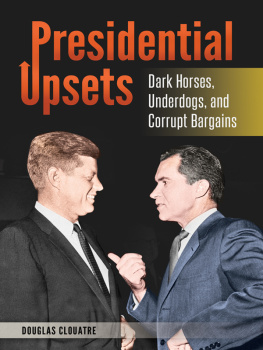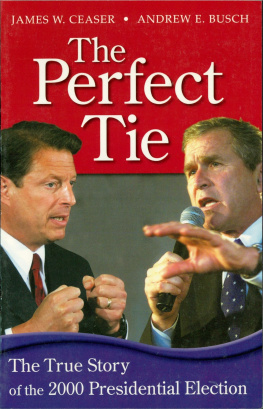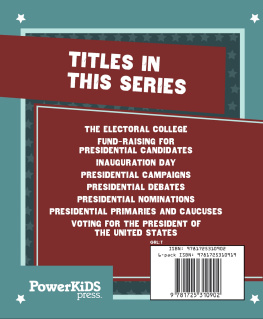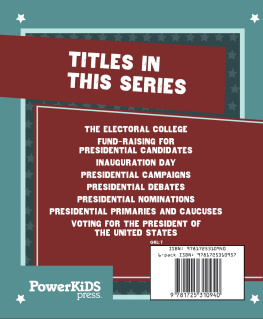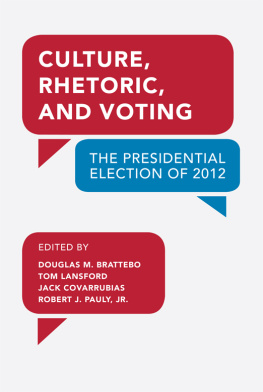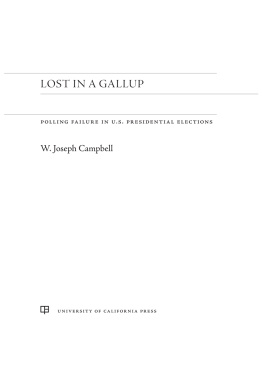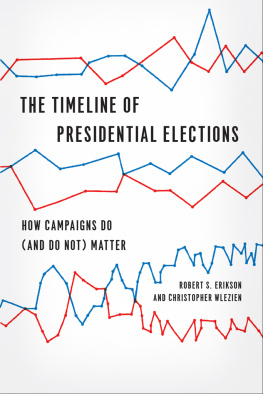All rights reserved. No part of this publication may be reproduced, stored in a retrieval system, or transmitted, in any form or by any means, electronic, mechanical, photocopying, recording, or otherwise, except for the inclusion of brief quotations in a review, without prior permission in writing from the publisher.
Clouatre, Doug.
Presidential upsets : dark horses, underdogs, and corrupt bargains /
Douglas Clouatre.
p. cm.
Includes bibliographical references and index.
ISBN 978-1-4408-2866-9 (hardcopy : alk. paper) ISBN 978-1-4408-2867-6
(ebook) 1. PresidentsUnited StatesElectionHistory. I. Title.
JK524.C55 2012
324.973dc23 2012038152
This book is also available on the World Wide Web as an eBook.
Visit www.abc-clio.com for details.
Preface
In the midst of a presidential election, hopes and reality tend to clash. Supporters of the major party candidates enter the election completely convinced of their candidate's ultimate victory. Reality has the effect of destroying those hopes in the worst possible terms either through a crushing loss that was apparent to all but those most dreamy-eyed or in a sudden and unexpected defeat that leaves supporters wondering how their candidate lost.
A presidential upset is the latter of these. In a presidential upset, a candidate's supporters believe with good cause that their candidate will win with opinion polls and campaign events appearing to show that victory in November is certain. When Election Day comes those beliefs are shattered as the candidate sees his inevitable victory become a historic defeat. The result is such a surprise that the election becomes part of popular lore whether it is Harry Truman's stunning victory in 1948 or John Kennedy's tainted victory in 1960 with subsequent elections compared with these.
Supporters of the defeated candidate search for an explanation, attributing the loss to the candidate's personality, the candidate's campaign, to events beyond the candidate's control, or even to corruption in the election process. Frequently upsets are misinterpreted by the candidates and their supporters who then focus on the next presidential election to prove their analysis is correct only to see their party lose once again.
This book will examine 11 presidential elections generally recognized as upsets. In addition to describing the upsets the book will explain why the upset occurred and rank it among the other presidential upsets. There will be a focus on the issues, the candidates, the political era, the mistakes made by the expected winner, and the critical decisions made by the winner which led to the upset.
Constructing a book requires more than one hand or mind. Among those who helped by reading, editing, and suggesting improvements are Nicholas Thayer and Joshua Carson who provided important comments and guidance in improvement. A special thanks to Misty McClain who provided essential help in editing and suggesting improvements. Finally, there are Grogo and Alfreida Leedham whose antics always help in regaining perspective.
1
Anatomy of a Presidential Upset

Presidential election upsets are the stuff of American lore when a hardscrabble underdog battles the favored candidate and sweeps to victory on the votes of ordinary people who admire his feistiness. There are scenes of triumph, Truman holding above his head a copy of the Chicago Tribune prematurely announcing his defeat, and stories of overconfident candidates such as Charles Evans Hughes going to bed on election night in 1916 certain of victory only to awake the next morning to unexpected defeat. Controversies also cloud upsets: the corrupt bargain of 1824 denying Andrew Jackson the presidency, southern carpetbaggers rejecting Democrat votes during the 1876 election, or the open corruption of the dead voting for John Kennedy in Chicago in 1960. The 2000 election offered its own infuriating and humorous debate over dimpled, pregnant, and swinging chads as 1940s technology was used to determine the first 21st-century president. There were also Aaron Burr's treachery, Henry Clay's tragedy, and Richard Nixon's sweaty upper lipall part of presidential upsets.
Separating presidential election upsets from other presidential elections offers certain challenges as does ranking the upsets. An upset election is by definition an unexpected event in which a candidate who was expected to win loses instead. That expectation is based on predictions by both political professionals and laymen. Understanding the art and science of presidential election predictions allows one to rank presidential upsets and to know which election would be considered the greatest upset.
Professional election predictions may have begun with Louis Bean, an obscure economist at the U.S. Department of Agriculture, who used his statistical knowledge to create a political measure known as the Bean Poll. Using his data, Bean predicted Truman would win in 1948his prediction earning him fame as few political observers expected the president to be reelected.
Bean's basic measures were expanded as political scientists developed new and more complex measures of political behavior while integrating economic data that might have an effect on presidential voting. Some were basic measures, integrating fewer than a dozen economic and political variables into a formula that would predict electoral vote counts based on past elections.
By the early 1990s, several models had been developed for predicting presidential election outcomes. These models reflected the emphasis on statistics among political scientists as they struggled to reduce campaign rhetoric, partisanship, and voter decision making into numerical measures. Combined with these were more solid economic measures of inflation, unemployment, GDP growth, and public approval ratings. The calculations and formulas are impressive and at times incomprehensible with economic statistics regressed against past total electoral votes to arrive at a prediction.
The first real test of the models came in 1992, and political scientists were soon embarrassed after they predicted a fairly easy reelection victory for George H. W. Bush. The election of Bill Clinton sent analysts back to the drawing board as they searched for variables not in their model but relevant to Bush's defeat. Looking back on 1992, they found two important differences, the primary challenge of Bush by Pat Buchanan and the third-party candidacy of Ross Perot, both of which were not included in the models but had a negative impact on Bush's electoral chances.
With mathematical models limited to factors that were statistically measurable, other models have been developed, moving beyond complex equations to include broader measures of political trends. Allen Lichtman, a professor at American University, offered 13 keys to predicting a presidential election. Lichtman utilized not only quantitative data including long-term and short-term economic growth along with losses for the party in power during midterm election but also more qualitative measures that could not be broken down into statistics. Lichtman integrated factors from the 1992 election including an independent candidacy and a primary challenge to an incumbent. Other factors ranged from international policiesan unusual variable as few presidential elections are decided on the basis of foreign policydramatic changes in social policy, social unrest, and the charisma displayed by each candidate.

